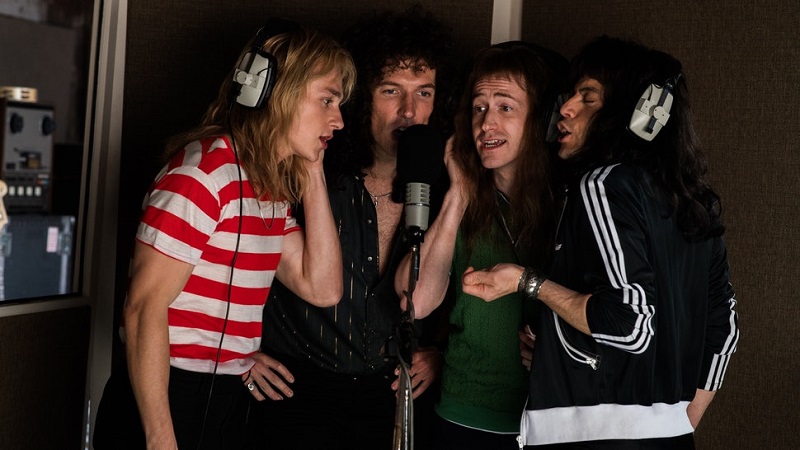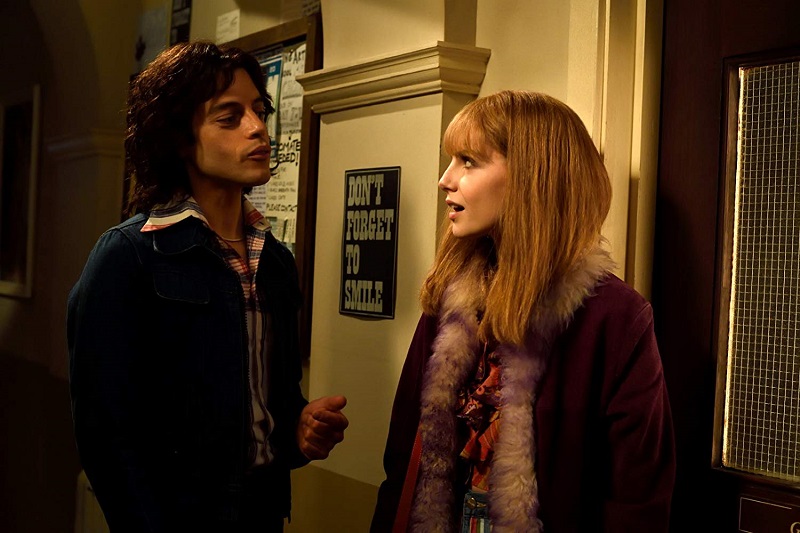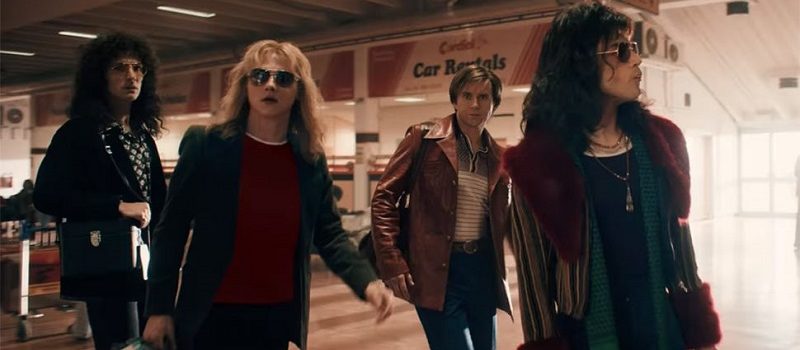One of the greatest rock and roll frontmen of all time and his band get the biopic treatment in the global blockbuster smash, Bohemian Rhapsody. It wasn’t just audiences who were moved by the story of Freddie Mercury and his band, Queen. The film, out now on Blu-Ray, DVD and digital download formats, also earned five Oscar nominations—including Best Picture and Best Actor for the moving, beautiful and mesmerizing performance turned in by Rami Malek.

The number one music biopic of all time, with its $845.9 million cume (so far!), is a dazzling, toe-tapping, head banging, tear-jerking and wildly entertaining journey through the history of Queen and its lead singer who tragically perished on November 24, 1991 due to complications from AIDS.
One cannot commence heaping praise on Bohemian Rhapsody without starting with the hurricane of brilliance that is Malek. He loses himself in the genius in such a manner that it is now hard to think about Mercury without thinking of Malek and the gift he gave Mercury’s fans with his performance. His turn is simply that extraordinary. That is no easy feat by a long shot. There are few musical icons that are as well known, recognizable and larger-than-life than Queen’s lead singer. To overcome that, for an actor, could be the most thankless of tasks. From dozens of music videos, to their legendary Live Aid performance in 1985 that many musical experts consider one of the best live performances of all time, Malek’s uphill battle to becoming Mercury had to be taxing physically, mentally and emotionally.
Bohemian Rhapsody begins on a short dual path. The band—drummer Roger Taylor (Ben Hardy), guitarist Brian May (Gwilym Lee) and bassist John Deacon (Joseph Mazzello, yeah… the kid from the original Jurassic Park!) and then there’s Mercury. At the time that the fateful four met, the group was known as Smile. As portrayed in the film (it is slightly different in real life), Smile lost their lead singer and Mercury happened to be in the audience for that “final” performance and offered his singing services to the group. The G-d given talent that Mercury possessed blew them away and those paths would merge into one and continue for decades delivering music to the masses that was as diverse as music can be. That is certainly why the band is so endeared by such a wide swath of the public.
They get their first breakout hit, Killer Queen, and the taste of stardom is so sweet that the group dives in and sticks to their creative guns, despite what their record company executive, Ray Foster (Mike Myers) felt about some of their more “out there” tracks. A Night at the Opera was the album and Bohemian Rhapsody was the single and as they say, the rest was history. Foster didn’t believe that anyone would listen to a six-minute-plus song and that the band had no future if they were going to keep exploring their musical palette with a diverse sound and style. What’s a band to do? They left Foster’s company and had someone else release their albums. Smart move…
While their star was rising, Mercury met one of the true loves of his life—Mary Austin (Lucy Boynton). The two were kindred spirits and remained so until the singer passed away. They dated and then as Mercury embraced his inner truth (that he was gay,) they remained the closest friends and confidants. She was one of his greatest supporters (in every sense of the word). As the relationship is portrayed in Bohemian Rhapsody, the pair could not have been better friends. What else that is portrayed in the film is how the band responded to Mercury’s sexuality. At first, it seemed a problem—after all, this was the 70s and early 80s and homosexuality was not something discussed, much less embraced, in rock and roll music. That challenged their relationship, but as seen in the film, their hits just kept on coming.
Check out my full theatrical Bohemian Rhapsody review!
Now, many of us who are lifelong Queen fans and know everything there is to know about the band, there are issues with some of the creative license that filmmakers took with their story. For example, when the movie reveals how We Will Rock You came to be, Mercury waltzes into the studio with newly cut short hair and his iconic mustache. The thing is… he did not sport that look for years to come. But I am a firm believer that when you enter a biopic on any soul, regardless of their walk in life, one thing must be understood—the most important word in “based on a true story” is that first one. Choices are made to help streamline the plot and the forward movement of the story, coupled with the tone that filmmakers are going after to spotlight the exact reasons why this person who is the subject of the biopic is worthy of such an honor.
The one alteration to the facts that mildly was jarring for this writer was how the day of Live Aid was portrayed. Ever since this film was first considered, May and Taylor knew that the final moment of the story had to be their triumphant Live Aid set that billions of people across the globe witnessed on television. Why filmmakers felt the need to jam so much into that day for Mercury and the boys escapes me. The enigmatic singer finds his love, comes out to his parents (who brought him to the UK from Zanzibar when he was young) and discovered that he had AIDS (which didn’t happen for several years in real life).

They also claim that the band had only recently “reunited.” The truth is the band was in the middle of a tour at the time and had been performing together for some time when that blinding Live Aid spotlight turned on the four lads who changed the musical landscape forever.
Even with that historic alteration to the band’s timeline in Bohemian Rhapsody, that Live Aid sequence is jaw-dropping and hits the viewer like an anvil—in the most welcoming of ways. It is practically a shot-for-shot recreation of the performance, albeit made a tad more concise than the full set that was played back in 1985. It is mesmerizing how the creative team of the film not only captured that moment in time that would define the band for the ages, but firmly put the movie’s viewers in Wembley Arena for a bird’s eye view of history. It is a stunning and triumphant sequence, worthy of the seismic mark it left on society in real life. So much so, that I could care about the band’s timeline being compressed or altered by its conclusion.
Something else that Bohemian Rhapsody does so extraordinarily well is illustrate how the band Queen is a perfect example of musical souls joining forces to fatefully influence lives, entertain billions and craft their artistry in a manner that leaves us all believing that every single member of the band was meant to play with the others. When one thinks about their musical catalog, the style and tone of Deacon was a match made in heaven for the band. May was the guitarist born to bring the group’s heavy power and Taylor provided the pitch perfect percussion for everything from Radio Gaga to Another One Bites the Dust.
Then, there’s the magic that is Mercury. There is little debate from anyone with two good ears that the singer was not only one of the best frontmen ever in the music business, but the quality of his voice itself is one of those once in a lifetime gifts that we will never see again. The film illustrates that these four gentlemen collectively were put on this earth to craft the countless magical musical moments that Queen would gift to us all.

When lauding the astonishing performance of Malek, his titanic turn is not achieved in a vacuum. His scene partners, from his onscreen bandmates to his lifelong love, portrayed brilliantly by Boynton, were fated to find each other in this joyous salute to Mercury and his fellow magnificent musicians. The ensemble’s fate mirrors the band itself. Of note was the turn by Lee. May is an inescapable figure in music history and like Malek, the actor had the cards stacked against him trying to bring something special to someone so known by so many. Lee beautifully brings alive the nuances of the guitarist, the verbal pattern of his speech, right on down to his delicate but deliberate stage presence. Boynton impeccably and lovingly captures the woman who was arguably the most important person in Mercury’s life, save Jim Hutton (Aaron McCusker)—the man who the singer found blissful love with towards the end of his life.
Another aspect of the film that I could not be more thrilled with is how filmmakers portrayed the singer and his passion for his felines. They were his fur babies and would frequently talk to them on the phone while out on the road. Austin would answer the phone, talk to her BFF, and then put the phone up to his cat’s ears. It’s a small thing, but a huge aspect of capturing the truth of who Mercury was and where his heart lay.
The greatest of the Bohemian Rhapsody Blu-Ray bonus features is a true gift from filmmakers and 20th Century Fox to the world. The full 22-minute set by Queen from Live Aid is featured in its entirety. Viewers get to bask in the brilliance of the set with two songs cut from the seen in cinemas sequence—Crazy Little Thing Called Love and We Will Rock You. The Live Aid featurette is one that you will want to watch on repeat and return to repeatedly through your life, i.e. bring Bohemian Rhapsody home and add it to your collection! It is a must-own of the highest order.
A truly fascinating featurette is Rami Malek: Becoming Freddie. How the actor crafted his “character,” that to legions is a rock G-d, is painstakingly portrayed in the bonus feature. Hearing how Malek felt that he not only needed a choreographer to capture the enigmatic vocalist, but a movement coach to fully inhabit the essence that was Mercury, is visionary. Seeing Malek and his coach collaborate and thread that needle that is being the character and not an impersonator is simply stunning. Overall insight from Malek is also priceless. In fact, many who are curious about a career in the art of acting should study this bonus feature—it is like an thespian masterclass.
The Look and Sound of Queen features the cast speaking to their collaboration as a unified thespian quartet, finding their groove as the real-life rock and roll quartet largely considered one of the greatest bands of all time. There is also great insight offered into the costuming of the group and how that tactile and visual element of the performance was the final piece of the puzzle for the actors in finding their truth.

Lastly, if Becoming Freddie Mercury is a masterclass in acting, then the bonus feature Recreating Live Aid is a masterclass in production design and how that historic moment was captured onscreen. The real-life May and Taylor offer insight into their contribution to achieving magnificent movie magic. The most joyous moment of this featurette finds May and Taylor, arriving on the Live Aid movie set. It is almost as if the pair had been put in a time machine.
Their joy and wonder are palpable.
That’s extremely fitting because that is exactly how I felt watching Bohemian Rhapsody.
Film grade: B+
Bonus features: A

